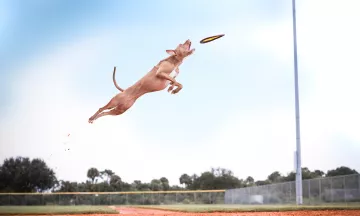Why do I need to socialise my puppy?
It’s important to socialise your puppy in order for it to grow into a friendly, stable and calm dog. ‘Socialisation’ is the process of teaching a puppy how to interact with other dogs, people and situations. This process includes learning and experiencing new smells, sounds, sights and behaviours. If a puppy isn’t well socialised, it may grow into an anxious or aggressive adult dog.

When is the best time to socialise a puppy?
The ideal time to socialise a puppy is from approximately 3-17 weeks of age when they are most ready to learn. However, it’s really important not to allow your puppy with other dogs before they have all their vaccinations. The reason for this is to protect your vulnerable puppy from catching infectious diseases and becoming very sick. But there are still opportunities to socialise during this time, as every new experience is a chance to learn!
The truth is that socialisation happens from the moment your puppy meets you. Therefore, you can start them safely at home by giving them new toys to chew and play with. You can also expose your puppy to different surfaces such as carpet and grass, and noisy appliances such as the vacuum. You can also start puppy toilet training at this time. Be calm and reassuring around your new pup (they are just getting started in life, after all!). Here are some tips to stop your puppy from biting and how to crate train.
Once your puppy has had their vaccinations, you might consider taking them to puppy preschool. This is a supervised environment in which puppies can meet and learn some basic training. Speak with the vet, as they will be able to tell you about local puppy preschool groups.

What are some other ways to socialise a puppy?
Socialisation doesn’t end with puppy preschool. This is because, whether young or old, all dogs need ongoing stimulation and training.
Be sure to take it nice and slow with your puppy. Don’t overwhelm them by pushing them into a stressful situation. Likewise, don’t fuss and scoop them up every time they are faced with a challenge. Stay calm and use your judgement: let your puppy take the lead and if a situation is getting too much, quietly remove your puppy.
Here are some more easy ways to incorporate socialisation into your dog’s daily routine:
Walk your puppy
It’s important to walk your dog every single day for their physical and mental health. Let them sniff and explore the environment, as well as (safely) meet other dogs and people. You can also teach them loose-leash walking to make walkies less frantic!
Invite friends and family over
Let your puppy meet and greet new people on a regular basis. Be sure to inform visitors if you are training your puppy to not bite or jump, as you don’t want anyone undermining your teaching by playing rough. Regardless, it’s great for a puppy to meet a wide variety of new people (and we’re sure your friends and family won’t mind this one bit!).

Use a puppy socialisation checklist
A socialisation checklist is a great way to tick off all the different people, places and situations you want your puppy to get used to. Your vet might offer you one, otherwise here is a copy to download. You may wish to add extra items if you think they are important for your puppy to get used to.
Hire a puppy sitter
If you can’t be home during the day, a puppy sitter can help you out. Be sure to choose someone who is confident and experienced in puppy sitting. Furthermore, always have a meet and greet and be clear on your expectations. Your puppy sitter might even be able to teach your pup a few tricks during the day or, at the very least, take them on a long, exciting walk. We recommend that you never leave your puppy home alone unattended.





